Menu Toggle
In this issue
Section 1
Message From the President
Section 2
The Best Job I Ever Had
Executive Director's Message
Section 3
Uncommon Knowledge
A Self-Professed Lifelong Learner, Bushra Waheed Has Four Post-Secondary Degrees Words by Jessica Natale Woollard Photos by Aaron Lutsch
Section 4
Convention recap
Convention brings members together to exchange ideas and gain a deeper understanding of the PEA and issues within the broader labour movement Words by Jordana Whetter Photos by Aaron Lutsch
Section 5
2024 Scholarship and Bursary Recipients
Words by Jordana Whetter
Section 6
Introducing Our New President
In May 2024, Cliff Haman was elected President after many years of advocacy for the PEA and the UVic chapter Words by Jessica Natale Woollard Photos by Aaron Lutsch
Section 7
PEA Updates
Message From the President
Writing this, I’ve just observed a great kettle of turkey vultures assembling for migration. It’s an impressive reminder that the changeable fall season approaches, maybe sooner than some would like! As an employee at the University of Victoria, the arrival of autumn evokes a curious combination of joyous anticipation and back-to-school trepidation. There is some comfort in the reliable, cyclical nature of the seasons and the semesters, yet this year is different given my new responsibilities at the PEA. I’m excited to collaborate with our executive and staff teams to advance the important work of our union.
I would like to take this opportunity to thank everyone who attended Convention in June, at which I was acclaimed as the new President. It is an honour to be in this role and I am grateful to the outgoing table officers, particularly past president Shawna LaRade. Shawna’s guidance, leadership, openness and sense of humor has supported us over two great terms.
While this edition of The Pro includes a comprehensive recap of the Convention, I will also share my own reflections. As a constitutional mandate, our Convention, held every three years, is a pivotal event where we elect union officers, review our progress, and share the achievements and direction of the PEA. This year saw a record number of resolutions, some of which passed smoothly while others sparked intense debate and were ultimately referred to the Association Executive for further consideration. Being a union of some 3800 members, it is expected that we will have a broad spectrum of ideas and positions on any given issue. I view this as intrinsically positive for the association, and reflective of the many types of diversity in our membership. While the contentious nature of some discussions may seem divisive, they are a testament to the democratic vigor of our union, and we must not shy away from having them. Vigorous debate, however challenging, is crucial for ensuring that voices are heard, and decisions are thoroughly vetted. Participating in this democratic process and questioning our assumptions, even when it leads to disagreements, strengthens our union. It fosters a more robust and thoughtful approach to achieving our collective goals. If you would like to discuss anything from Convention, please contact me directly. I’m always available to speak with members.
Finally, and perhaps most importantly, I would like to take this opportunity to recognize Scott McCannell, who has been the PEA’s Executive Director for the past 14 years. Scott will retire later this year, and we have commenced the recruitment process to find a new Executive Director. As a table officer, I have worked closely with Scott these last few years and appreciate his candor, tremendous knowledge and experience, his decency, and his grounded leadership style. Scott will be greatly missed at the PEA, and we wish him the best in this next chapter.
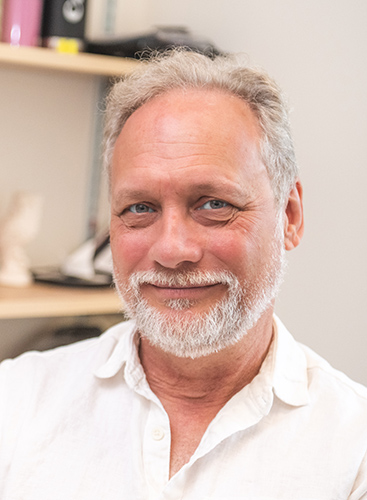 Cliff Haman
Cliff Haman
PEA President
The Best Job I Ever Had
Executive Director's Message
After 14 fulfilling years as the PEA’s Executive Director (ED), I will be retiring this December 2024. It has truly been an honour and privilege to serve the PEA, and I have often remarked that my role as ED has been the best job I ever had.
I first joined the PEA as a Labour Relations Officer in 2010, servicing our UVic and SMS chapters. Later that year, I was appointed ED. Throughout my time, the most gratifying aspect of this job has been collaborating with our elected leaders, members and my staff colleagues to chart a path that ensures the PEA remains a strong, inclusive and member-focused union.
The PEA’s progress has always reflected the degree to which our members have engaged with the union. High levels of engagement were behind the PEA’s first significant job action in 2012 when the GLP chapter engaged in work-to-rule, targeted job action and then a full province-wide strike. This collective effort compelled the government to reconsider its concessionary stance, resulting in wage mandate improvements across the public sector. It also bolstered the PEA’s capacity and resolve, preparing us to confidently pursue fair outcomes through strike mandates and other forms of job action.
While job action remains the exception rather than the rule, it is a critical tool when bargaining calls for a demonstration of members’ resolve and solidarity.
As part of our renewal strategy in the early 2000s, the PEA prioritized union education, proactive lobbying efforts, internal and external campaigns and, most importantly, enhancing membership engagement. Strategic alliances, including our 2013 affiliation with the BC Federation of Labour and partnerships with aligned organizations, further strengthened our advocacy efforts.
In recent years, the PEA has added an organizer position and successfully increased the number of chapters and members. We are also setting out steps for greater equity, diversity and inclusiveness (EDI) and have ramped up chapter specific initiatives and campaigns. My thanks to everyone who shared their stories and comments in our recent EDI survey.
The dedicated PEA staff team has mostly been together over my time as ED. It has been amazing to see them develop as leaders, subject matter experts and champions of various PEA initiatives. We are all fortunate as PEA staff to have work that leads directly to bettering member’s lives. The passion that the staff team brings for member servicing and services to members is something I have witnessed and appreciated, day in and day out.
The PEA has had extremely dedicated elected leaders on chapter executives and committees and also at the PEA level. There have been more elections for table officers in recent years, which, in my view, reflects an increasing awareness among members as to how critical effective elected leaders are. I have been very fortunate to work closely with the table officers and have appreciated their creativity, wisdom and support.
Over the years, it has been gratifying to hear other union leaders acknowledge that the PEA consistently punches above its weight. As we navigate these increasingly complex times, I have full confidence that with our united membership, dedicated staff team and exceptional leaders, the PEA will continue to thrive.
I am deeply grateful for the opportunity to have been part of the PEA’s remarkable journey.
Thank you,
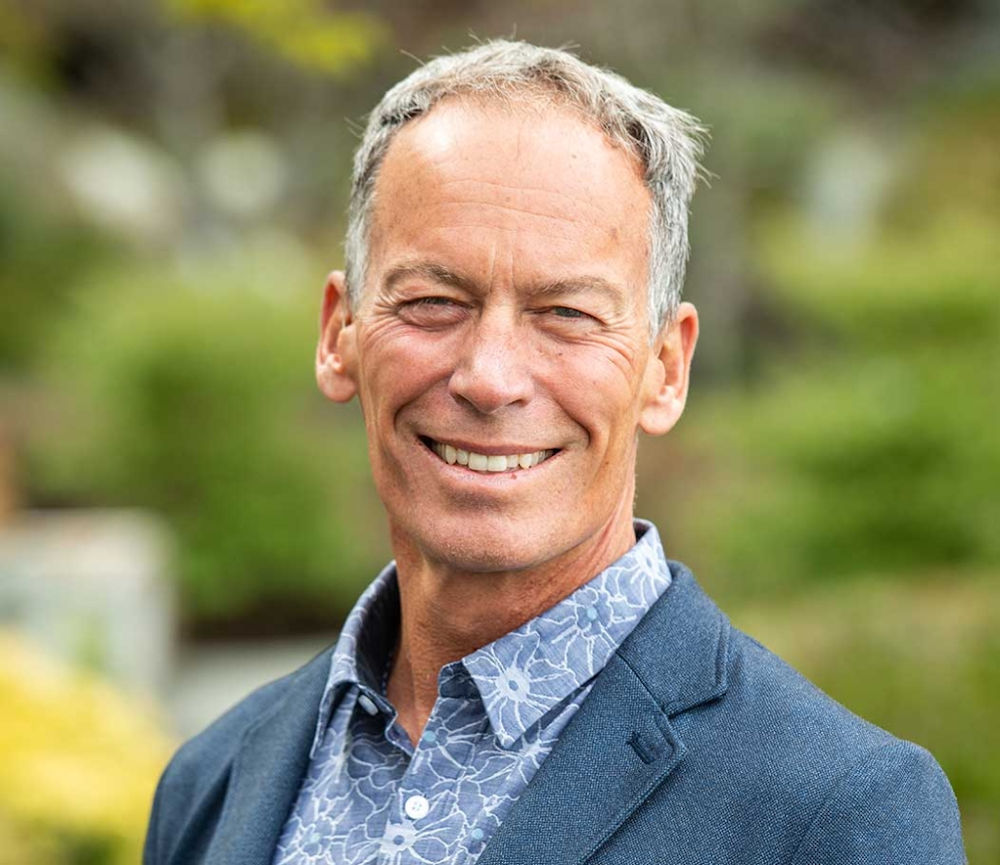 Scott McCannell
Scott McCannell
Executive Director
Uncommon Knowledge
A Self-Professed Lifelong Learner, Bushra Waheed Has Four Post-Secondary Degrees Words by Jessica Natale Woollard Photos by Aaron Lutsch
Safety is paramount in the energy industry. The consequences of an accident—an oil spill, for example—could be detrimental to human lives and the environment.
You need the right people in place to ensure the safe functioning of energy infrastructure.
In B.C., the integrity of infrastructure assets, such as pipelines and facilities and the regulation of companies who operate them, lie in the capable hands of members of the Professional Employees Association.
These engineers, geoscientists and geologists work for the British Columbia Energy Regulator (BCER), which, until February 2023, operated as the BC Oil and Gas Commission. Thirty-five members are stationed around the province, including seven at the crown corporation’s headquarters in remote Fort St. John in B.C.’s north-east, an hour’s drive from the Alberta border.
The collective expertise of PEA members across the province ensures energy infrastructure is operated safely, to protect people and the environment.
“The BCER stands for responsible regulation of energy activity in BCER,” explains Bushra Waheed, a senior integrity auditor at BCER and vice president of the PEA’s BCER chapter. “My work verifies the effectiveness of safety management processes and procedures for managing the risks associated with the energy operation —to the environment, to the public, to the property.”
Waheed, who has been with BCER since 2011, has become adept at explaining her complex role to people outside the sector:
“The purpose of a pipeline is to transport fluid from point A to point B,” she describes. “Integrity is maintained if a fluid stays inside the pipeline. What is under our control is to assure that the resources that run through the pipelines and the energy infrastructure—the veins and the arteries of the energy system—run properly with minimal damage.”
Every year, BCER conducts 24 integrity management audits of the 60 to 100 companies that operate and maintain pipeline infrastructure in the province. Each company is audited on a five-year cycle. A typical audit will take Waheed three to four hours to ensure auditees are adhering to the province’s safety standards and regulatory requirements. However, pre- and post-audit activities—such as planning, research, reviewing information, report writing, following up on corrective actions to resolve the audit findings and analysis of data—take months, depending on the scope of the audit and who is involved.

BC Energy Regulator History
“Audits require attention to detail and a keen eye,” Waheed explains. “My strength is in ensuring all the required areas for the audit are fully discussed and evaluated during the allocated time and ensuring auditing is a worthwhile experience for us and the auditee from the process improvement perspective.”
To balance this technical and cerebral work, Waheed ensures her workday includes activities to nurture mind, body and soul—a good breakfast, prayer, meditation, and a walk or run at lunch time while listening to her favourite podcast, Blinkist, which summarizes key insights from non-fiction.
For the last 13 years, Waheed’s focus has been primarily on pipeline and facility infrastructure, but, as the energy industry begins its transition to clean energy, the work is changing.
“We are very dependent on fossil fuels at the moment, but there are other options that are being looked at,” she explains, citing hydrogen, geothermal and LNG as potential energy sources for the province.
“We are not the policymakers; we are policy takers,” she continues, adding that BCER follows the provincial government’s climate change objectives, which include the development of non-carbon fuel—hence BCER’s rebranding to a name inclusive of new energy sources.
Waheed welcomes the changes coming; they present an opportunity for her to learn more. She thrives on lifelong learning, embracing both informal and formal education opportunities. Over three decades, she earned four post-secondary degrees, including two master’s degrees and a doctorate. Waheed began her formal education at the University of Engineering and Technology in her native country of Pakistan, graduating with an undergraduate degree in civil engineering in 1993. Next, she earned her first master’s degree in environmental engineering at the University of Sydney in Australia in 1996.
Growth is not just the work you do, it’s your personal journey as well.
In 2000, Waheed relocated to Newfoundland where her husband was getting a PhD at Memorial University. The pair pursued work opportunities first in St. John’s, then Ottawa and finally Kelowna, where they currently live with their two university-aged children. Prior to joining BCER in Kelowna, Waheed worked for SNC-Lavalin (now AtkinsRéalis), at the National Research Council, and as an engineering consultant.
Following in her husband’s footsteps, she enrolled in a PhD program at Memorial University, completing her doctorate in environmental engineering in sustainable decision making in 2011, the year she began at BCER in an entry-level position.
“I started at the lowest level, even though I was overqualified, because it was a new sector for me,” she explains. “It was a good opportunity to learn and to grow as a professional.”
Within a year, Waheed had moved into integrity management and evolved into her current role as senior integrity auditor, a role she enjoys to this day because of its blend of technical engineering and systems management skills.
“I know that the work I do is important,” she says. “I’m given interesting projects to work on, and I get to keep learning. Growth is not just the work you do, it’s your personal journey as well.”
Ten years after finishing her PhD, Waheed was back in school, this time completing an MBA through the Australian Institute of Business. She graduated with her fourth degree in 2024.
The MBA “gave me a different perspective from engineering, which is technical, difficult and about problem solving,” she explains. “The hardest thing of all is dealing with people. To learn human resources are the most significant asset of any company. Learning what people value and making sure that things are done right for people is an area I’m very interested in.”
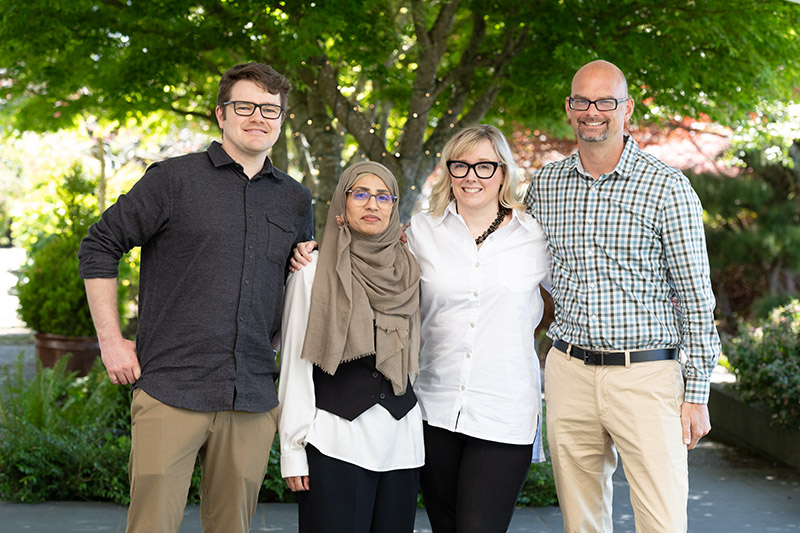
In 2023, Waheed embraced another learning opportunity by taking on the role of vice president of the PEA’s BCER chapter.
“At this time of my career, I strongly felt that it’s time to give back and to work for the people,” she reflects. “My time will be best served if I can contribute and advocate for the rights of our members.”
The BCER chapter was created in October 2023, eight months after the BCER name and mandate change. Previously, these members had been part of the Government Licensed Professionals (GLP) chapter, and although they had their own collective agreement, their needs—often very different than those of fellow GLP members—were represented by a single person. The BCER voice would benefit from being louder, to better meet the varied requirements of engineers, geoscientists and geologists in the energy industry.
“I think being our own chapter provides us with more liberty and focused vision,” Waheed notes.
She will no doubt apply her management systems and engineering thinking to the role. “When you’re an engineer with a systems-thinking approach, you know how to find more informed and rational solutions through a structured approach to align with organizational goals and strategies,” she says.
“There’s a lot of potential [in this new chapter]. I want to inculcate a culture of leadership, so the members have their professional needs met,” she continues. “I want to make a positive change wherever I go, and that’s what I intend to do.”
Convention recap
Convention brings members together to exchange ideas and gain a deeper understanding of the PEA and issues within the broader labour movement Words by Jordana Whetter Photos by Aaron Lutsch
The PEA Convention happens every three years and is an important constitutional event at which members are elected by their chapter to attend. Over two days, members hear from PEA leaders on the current status of the union but also debate and vote on resolutions, elect table officers to serve on the Association Executive and catch up on current trends in the policy environment for labour unions.
The first day of the PEA’s 15th Constitutional Convention in Victoria on May 9th and 10th opened with a performance from the talented ləkʷəŋən Traditional Dancers, followed by a look back at the PEA’s 50th history from Duty with Dignity author Ben Isitt.
Then it was on to union business with a review of strategic priorities, and the growth strategy, as well as equity, diversity and inclusion next steps from PEA President, Shawna LaRade. LaRade also thanked members for allowing her to serve as President for the last five years.
“As I step down from this role, I am filled with a profound sense of gratitude and a twinge of solace,” said LaRade in her address to members. “It was not an easy decision. I am so thankful for the friendships, the memories and the opportunity to learn and grow as a person and a leader. Thank you for entrusting me with the privilege of serving as your president.
“We have persevered through some challenging times. We are strong and well positioned with a dedicated group of staff and volunteers committed to expanding our collective rights and benefits.”

GLP Members
Executive Director Scott McCannell discussed bargaining within the PEA and touched on the changes and growth that the union has experienced over the last three years, including the addition of new chapters and staff.
PEA Secretary-Treasurer Melissa Doyle walked delegates through the overall financial health of the union and touched on the last three years of bargaining and membership-service costs related to grievances, arbitrations and mediations. All financial statements are available on the PEA website for review. The PEA’s auditor reported a clean audit and our investment advisor reported on the overall health of our investments.
On the first day of business half of the submitted resolutions were reviewed and five members received service awards for their dedication to the union. That evening, members were entertained over dinner and a reception by comedian and labour activist Charlie Demerse of CBC radio fame.
Day two kicked off with the election of the PEA’s new table officers and the remaining resolutions. BC Federation of Labour President, Sussanne Skidmore, spoke after lunch about the future of labour and the challenges ahead. Resolutions continued in the afternoon and LaRade closed convention by thanking members for their dedication and activism within the PEA and the broader union movement.
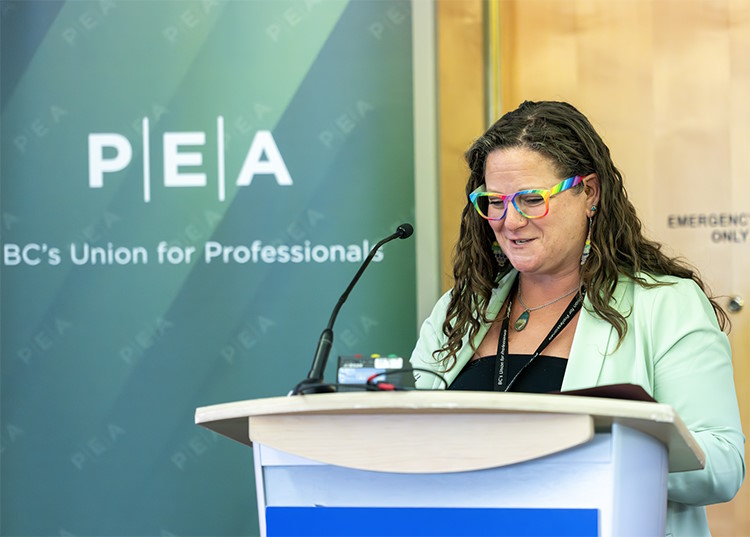
BC Federation of Labour President, Sussanne Skidmore
SERVICE AWARDS
PEA service awards are presented to members who have demonstrated substantial and continuous service to the union. This year we gave service awards to five exceptional leaders:
Melissa Doyle, UVic
Accessibility Advisor
Melissa has been the PEA’s Secretary-Treasurer since 2013, contributing an enormous amount of volunteer hours and effort. This means she has done three rounds of reviewing our financial reports, three rounds of chairing the Ways and Means Committee and presenting the financials to membership at Convention. Melissa has an incredible ability to delve into the details while minding the broader picture. She is forthright and diplomatic in her opinions and incredibly thoughtful. The PEA has benefited from the accessibility lens she brings to the union and from her championing of equity, diversity and inclusion.
Sandra Guerreiro, UVic
Audience Services Manager
Sandra joined the PEA in 1995, the very year the UVic chapter was formed. Since that time, she has continued, uninterrupted, to be an active local representative. She has been on every bargaining committee since 2004 and has a legendary reputation for taking extensive and detailed notes. At UVic, she is known as the PEA institutional memory. Many times, during bargaining, her copious notes from previous rounds and her excellent memory have given us a distinct advantage over the employer.
Shawna LaRade, GLP
Rangeland Stewardship Officer
Shawna is a gracious leader who has made many positive changes during her five years as president. She first became active as a GLP bargaining committee member in 2011 and then a local rep in 2014. She served on the GLP Executive from 2012 until 2019 when she ran from the floor during convention to become the PEA president. As a leader, she wishes to understand all perspectives and makes the time to work through issues to arrive at consensus and agreement. She brings a playful sense of humor to the table, which makes working with her equally fun and enjoyable.
Cherene Palmer, HESU
Representative
Cherene is an HESU Chapter member and has been our First VP since 2019. She has chaired the Staff Relations Committee, the Resolutions Committee and has sat at the table for two rounds of UWU bargaining for our PEA staff. She also served as the Chair of the HESU Chapter Executive from 2021 to 2023 and as HESU Chapter Secretary prior to that. Cherene is amazing in her role as a table officer because members are always front of mind. Thanks to her knowledge of labour relations and the labour movement, Cherene has anchored and guided the table officers through many important decisions.
Bev Waterfield, SMS
Teacher
Bev is the Chapter Chair of St. Margaret’s School and a long-standing member of our Association Executive. She has been an active union member for over ten years and has sat on countless PEA committees. Her leadership, advocacy and strong sense of fairness helped tremendously during the 2023 round of bargaining where she worked tirelessly to personally engage with PEA members. After multiple rounds of negotiations, Bev and the rest of the bargaining team achieved the richest collective agreement in PEA history.
THANK YOU
Thank you also to all the members from the Credentials, Resolutions, Sergeant-At-Arms and Ways and Means Committees for their time and dedication. We sincerely appreciate your involvement.
And of course, thank you to all the members who took time to attend convention and to debate, decide and vote on the business of our union.
The next PEA convention will be in 2027.
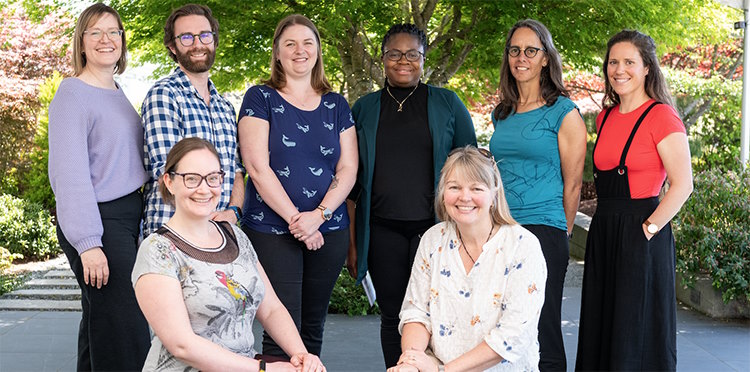
RESOLUTIONS
The resolutions committee considered 17 resolutions that were received by the March 1, 2024 deadline. One resolution was referred to the Ways and Means Committee. The following resolutions were passed, except for those that were referred as noted:
RESOLUTION 1: CONVENTION REPORTS
THEREFORE BE IT RESOLVED that the following changes will be made to the PEA Constitution and Bylaws reducing the 30-day distribution date to 20 days:
11. The Association Executive shall arrange that copies of resolutions received by the deadline be forwarded to all chapters at least twenty (20) days before convention.
12. The Association Executive shall arrange that each delegate to convention be sent a copy of all resolutions that have been received by the deadline, together with a copy of reports (President, Secretary-Treasurer, and Executive Director, along with the audited financial statements) to be submitted to the convention, at least twenty (20) days before convention.
RESOLUTION 2: VOTING BLOCKS
THEREFORE BE IT RESOLVED that PEA consider organizing Convention resolutions into consent blocks (e.g. Special Resolutions, Endorse Block, Do Not Endorse Block, No Recommendation, Referred Resolutions, etc. similar to UBCM resolution blocks) to allow efficient handling of resolutions on the Convention Floor; and
BE IT FURTHER RESOLVED that PEA determine a process whereby any member who wishes to speak to, amend or debate a particular resolution may request that resolution be removed from block voting and individually addressed on the Convention Floor.
RESOLUTION 3: CHANGES TO BC UNIVERSITY ACT
THEREFORE IT BE RESOLVED that the PEA work with other BC university unions to lobby government to change the University Act BOG composition to better reflect the diversity of employee groups on BC campuses and their representation within the governance structure.
RESOLUTION 4: ENHANCE PEA EQUITY, DIVERSITY AND INCLUSION
THEREFORE BE IT RESOLVED that the PEA implement policies and practices that enhance thought diversity and increase the openness to experiential diversity on PEA Committees.
RESOLUTION 5: INCLUSION AND PSYCHOLOGICAL SAFETY FOR INDIGENOUS PEA MEMBERS
THEREFORE BE IT RESOLVED that the PEA focuses efforts on improving the sense of belonging and psychological safety through member training and education, lobbying the provincial and federal governments to completing the remaining Calls to Action of the Truth and Reconciliation Commission, and decolonizing PEA collective agreements; and
BE IT FURTHER RESOLVED that PEA conduct Focus Groups with Indigenous Committee Members, with a focus on determining what initiatives or interventions are required to enhance inclusion and safety for Indigenous members of PEA; and
BE IT FURTHER RESOLVED that PEA use the recommendations of these Focus Groups to develop resources including a “Cultural Safety Checklist” for all committees that provides promising practices aimed at improving the inclusion and safety for Indigenous members; and
BE IT FURTHER RESOLVED that PEA provide Cultural Safety Training for PEA Leadership and Committee Members.
RESOLUTION 6: SUPPORTING INCLUSION AND PSYCHOLOGICAL SAFETY OF WOMEN AND GENDER-DIVERSE MEMBERS IN THE PEA
THEREFORE BE IT RESOLVED that PEA explore why women and gender-diverse members experience lower levels of inclusion and psychological safety; and
BE IT FURTHER RESOLVED that the PEA offer specific Training and Development Opportunities for women and gender-diverse members to address inclusion and psychological safety; and
BE IT FURTHER RESOLVED that the PEA develop an Inclusion Action Plan for Women and Gender-Diverse Members.
WAYS AND MEANS RESOLUTION: FINANCIAL INSTITUTION CHANGE
THEREFORE BE IT RESOLVED the PEA will investigate the implications of switching banking services over to alternate labour/worker-friendly banking institutions. The PEA Executive will decided this matter before May 10, 2025, and share the findings with the chapters.
RESOLUTION 7: PAY DISCREPANCY
Referred to GLP Bargaining Committee
THEREFORE BE IT RESOLVED that the PEA GLP Bargaining Committee is made aware that the starting pay for Licensed Science Officer (LSO) designations is less than the starting pay of an equivalent BCGEU designation.
RESOLUTION 8: PER DIEM TOO LOW
Referred to GLP Bargaining Committee
THEREFORE BE IT RESOLVED that the per diem is too low and should be re-evaluated as part of the next bargaining round as Cost of Living Allowance (COLA) adjustments do not account for rising hospitality industry costs and tip inflation domestically and internationally. This leaves PEA members that travel a lot for work to pay out of pocket or skimp on meals.
RESOLUTION 9: INCORPORATE IVF INTO BENEFITS
Referred to GLP Bargaining Committee
THEREFORE BE IT RESOLVED that the PEA notify the employer of the importance of Family Building Benefits, and consider them in future negotiation preparations, similar to those of University of British Columbia employees, what allow for members to obtain medical support for family planning
RESOLUTION 10: SUPPORTING HOME SUPPORT FOR OLDER ADULTS IN BC
THEREFORE BE IT RESOLVED that the PEA call on the BC Health Minister to fulfill the promise to bring in a new funding model that improves accuracy and transparency of reporting and ensures public funds intended for care are spent on care, not profits; and
BE IT FURTHER RESOLVED that PEA petition the Ministry of Health to follow the recommendations from the Results of 2023 Long-Term Care Resident and Visitor Survey and the 2023 Billion More Reasons to Care Report.
RESOLUTION 11: SUPPORTING HOME SUPPORT FOR OLDER ADULTS IN BC
THEREFORE BE IT RESOLVED that PEA call on the Province of BC to review its funding, staffing and service provision of Home Support programs and related programs such as Better At Home to allow more seniors to be supported to stay at home for longer and reduce strain on the Long Term Care system; and
BE IT FURTHER RESOLVED that PEA ask the provincial government to
– Make home support more accessible by removing the current regulated daily rate co-payment
-Provide comprehensive care by bringing Instrumental Activities of Daily Living back into the home support program.
RESOLUTION FROM THE FLOOR
Referred to Association Executive
THEREFORE BE IT RESOLVED that a resolution submitted to convention could be considered racist, homophobic, transphobic, Islamophobic, anti-Semitic, Asian-phobic, or hatred-inducing; any such submitted resolution will not be brought to a discussion nor a vote in convention to protect the mental and physical health of all members, before, during and after the convention.
RESOLUTION 12: GAZA SOLIDARITY
Referred to Association Executive
THEREFORE BE IT RESOLVED that PEA join other unions such as CUPE, CUPW, NUPGE, PSAC, Unifor, CAPE, and others in:
Demand the Canadian government call for an immediate and permanent ceasefire in Israel-Palestine, an end of its sale of arms to Israel, an end to diplomatic immunity for the state of Israel, and for an end to Israel’s blockade of Gaza and the restoration of aid and the basic necessities of life.
Demand the Canadian government reverse its decision to suspend UNRWA funding
Sign on to the Ceasefire Now Statement: https://ceasefirenow.ca/who-we-are
Conduct member education via the program and training prepared by Labour for Palestine and making it available to PEA members online, about Palestinian subjection to Israeli apartheid, Canada’s complicity, and what trade unions can do to support a just peace.
RESOLUTION 13
Withdrawn by submitter
RESOLUTION 14: DONATION TO THE PALESTINIAN CHILDREN’S RELIEF FUND
Referred to Grants and Donations Committee
THEREFORE BE IT RESOLVED that PEA will support the people of Gaza to address their immediate medical and humanitarian needs, through a donation of $10,000 to the Palestinian children’s relief fund.
RESOLUTION 15: PENSION FUND CLIMATE ACTION
THEREFORE BE IT RESOLVED that the PEA calls upon the PSPP board to require BCI to thoroughly evaluate and improve its climate plans, align with national and provincial climate targets, and invest in a safe climate future; and
BE IT FURTHER RESOLVED that the PEA urges the PSPP to ensure that BCI discloses a complete list of assets under management that align with a zero-carbon economy by mid-century at the latest, commits to aligning its portfolio with Canada’s commitment and the Paris agreement goal to limit global temperature increases to 1.5°C, places an immediate exclusionary screen on new oil, gas, coal, and pipeline investments, phases out all current oil, gas, coal, and pipeline investments by 2025, decarbonizes the pension portfolio by 2040, establishes ambitious targets for increased investments in profitable climate solutions, and develops a robust engagement strategy to ensure owned companies are on a rapid decarbonization pathway.
RESOLUTION FROM THE FLOOR: HARDSHIP FUND
Referred to Association Executive
THEREFORE BE IT RESOLVED that the PEA explore the creation of a hardship fund; and
BE IT FURTHER RESOLVED that the PEA bring forward an option for the creation of a PEA hardship fund; and
BE IT FURTHER RESOLVED that a vote be held by the membership to establish a hardship fund.
RESOLUTION FROM THE FLOOR: HOUSING:
Referred to Association Executive
BE IT RESOLVED that the PEA consider methods of supporting members with housing affordability including through the next rounds of bargaining.
RESOLUTION FROM THE FLOOR: CLIMATE CHANGE
Referred to Association Executive
THEREFORE BE IT RESOLVED that the PEA should become a leader in environmental sustainability by:
1. Continuing to lobby , provincial and federal governments for climate solutions, sustainable communities, and protection and restoration of nature.
2. Providing PEA members with education and resources on how they can take action to save the planet.
3. Providing PEA member with education and resources on dealing with climate anxiety.
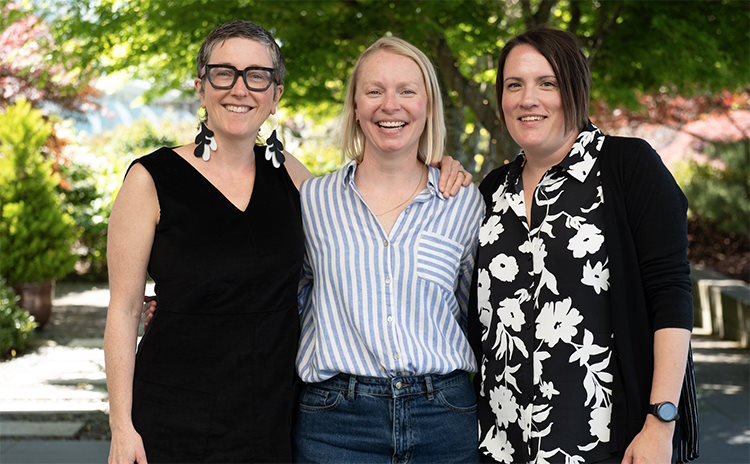
2024 Scholarship and Bursary Recipients
Words by Jordana Whetter
For over 30 years, the PEA has been giving scholarships and bursaries to PEA members and their families.
A total of 208 scholarship applications were received and those that met the eligibility criteria were entered into a random draw. This year, the awards committee was pleased to give 20 scholarships to PEA members and their relatives who are seen here.
From top left to right: Cole Alfonso, Corban Chambers, Emily Choi, Brownwyn Dunbar, Tyler Finlay, Aviva Isitt, Alexis Jang, Aisley Komatsu-Trehearne, Tristan Kandola, Elizabeth Montes, Sadman Mugdho, Kate Osmond, Natasha Roblesky, Isbella Tsui Ian Walsh, David Wang, and Myla Webb. Not pictured: Andrea Byrne, Christie Liu, and Jasmine Polajzar.
In addition, 14 bursaries of $500 each were given to the following members: Rhonda Bender, Lena Toncev, Sydney LaMarsh, Kim Monkman, Cory Steadman, Yanjing Wei, Robyn Darling, Amanda Field, Som Pun, Cindy Ashton, Anna MacDonell, Meriel Ballard, Ben Cross, Adesola Olajitan, Ian Holt, Sinisa Trajkovic, Emily Raven, Zach Walker, and Genevieve Thompson.
Applications for the 2025 scholarship and bursary awards will reopen in the spring. For more details visit pea.org/bursaries
Introducing Our New President
In May 2024, Cliff Haman was elected President after many years of advocacy for the PEA and the UVic chapter Words by Jessica Natale Woollard Photos by Aaron Lutsch
Newly elected president Cliff Haman has a vision for the PEA’s future that will draw on his professional expertise in creative problem solving.
In his role at the University of Victoria, he works with artists—faculty, staff and students—to help them solve complex problems with technology, such as robotics, lighting, software or programming. Although Haman does not describe himself as an artist in the traditional sense—he is not a painter or sculptor—he lives and breathes the creative process and applies it to his work, artistic and otherwise.
“The creative process is ultimately about working through problems and experimenting to find solutions to challenges,” Haman explains. “We can show people the possibilities.”
It’s creative thinking of that kind that he hopes to tap into as leader of the PEA executive.
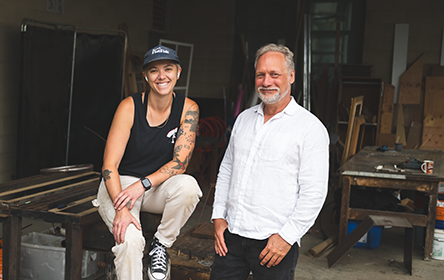
Cliff works as a senior academic administrator within the Visual Arts Department at UVic with two other PEA members, Hollis Roberts, the facilities and production manager (pictured here) and Carly Greene, workshops technician.
“It’s a creative process to be at a board table,” Haman adds. “We have multiple people looking at a problem, thinking about how we are going to resolve it in a way that we think is best for the organization and its membership.”
Haman has been a PEA member since joining UVic in 2003. He and his wife moved to Vancouver Island from Vancouver, where he served as IT director of a gaming company. His first role at the UVic was to build new computer labs for the visual arts department. Word quickly spread that Haman could help artists solve problems with technology, and faculty and students began coming to him for assistance. The informal one-on-one training he offered evolved into his current role, senior academic administrator in the Visual Arts Department in the Faculty of Fine Arts. A few years later, he designed a course for first-year students to help them expand their digital toolkit and learn technology skills to support their creativity. He teaches the course to this day and calls being in the classroom his “sweet spot”—he loves helping people learn the tools they need to solve problems and move ahead.
In 2007, Haman became involved in PEA’s UVic chapter, joining as a member at large and eventually serving as chair for two years. He led the members through a round of bargaining and then stepped back as his teaching responsibilities expanded.
When time allowed, he rejoined the UVic chapter in 2019 and in the same year ran for a member-at-large position on the executive. In May 2024, Haman was elected president of the PEA executive by his peers.
Haman says one of the executive’s first orders of business is to review the strategic plan and ensure it is pointing the PEA in the right direction.
“We’re going to spend a fair bit of time thinking about what the future is going to look like for the PEA over the next three-year term,” he says. “My vision is that I would like us to accomplish the very lofty and pragmatic goals that we identified at the strategic planning table, including increasing the visibility of the PEA as an organization. We need to do more member outreach and make sure people understand the what, the why and the how of what we do.”
He notes that some chapters have more than 90% of members actively engaging with the union. He’d like to celebrate their success while strengthening engagement in other chapters—because a stronger membership means more successful bargaining.
“We absolutely want to continue our primary mandate of bargaining successful and creative collective agreements for our membership,” says Haman, emphasizing that the coming year will see some complexities at the bargaining table because of the provincial election slated for October 19, 2024.
Another priority for Haman is equity, diversity and inclusion. “With all the strife in the world, we need to treat everybody with the same level of respect and compassion and regard. I think we can do better. As we progress, we’re going to have to deal with some of the ugliness that exists in the world, and that’s going to create difficult and hard conversations to have, but it’s important we have those difficult and hard conversations.”
Perhaps creative problem solving can lend a hand.
Haman describes one of the projects he gives his students: they travel to a parking lot in Victoria, and they examine the space. The students are tasked with transforming the lot into a desirable destination that will be used by all demographics.
“The most interesting are the challenging cases, the ones I don’t know how we’re going to solve,” explains Haman. “I love that work. You try things and see whether they will lead to a good result.
“Very rarely do we ever achieve success in the first or second try of doing things. Success tends to be a very iterative process.
“The only thing we ought not do is to not try things.”
PEA Updates
Upcoming Collective Agreement Expiry Dates
- BC Energy Regulator: June 30, 2025
- Family Maintenance Agency Lawyers: March 31, 2025
- Government Licensed Professionals: March 31, 2025
- Health Science Professionals: March 31, 2025
- Law Society: December 31, 2024
- Legal Aid BC Lawyers: September 30, 2025
- Okanagan Regional Library: December 31, 2026
- Pearson College: First collective agreement bargaining under way
- SGS AXYS: First collective agreement bargaining under way
- St. Margaret’s School: June 30, 2027
- University of Victoria: June 30, 2025
Labour Day
Thanks to all of our members who participated in Labour Day events across the province. We had representation in Prince George thanks to our GLP members, in Burnaby and Abbotsford thanks to our HESU members, and of course in Victoria with PEA staff behind the table.
If you live in Victoria you might have also seen our Labour Day ads in the Times Colonist and Victoria News.
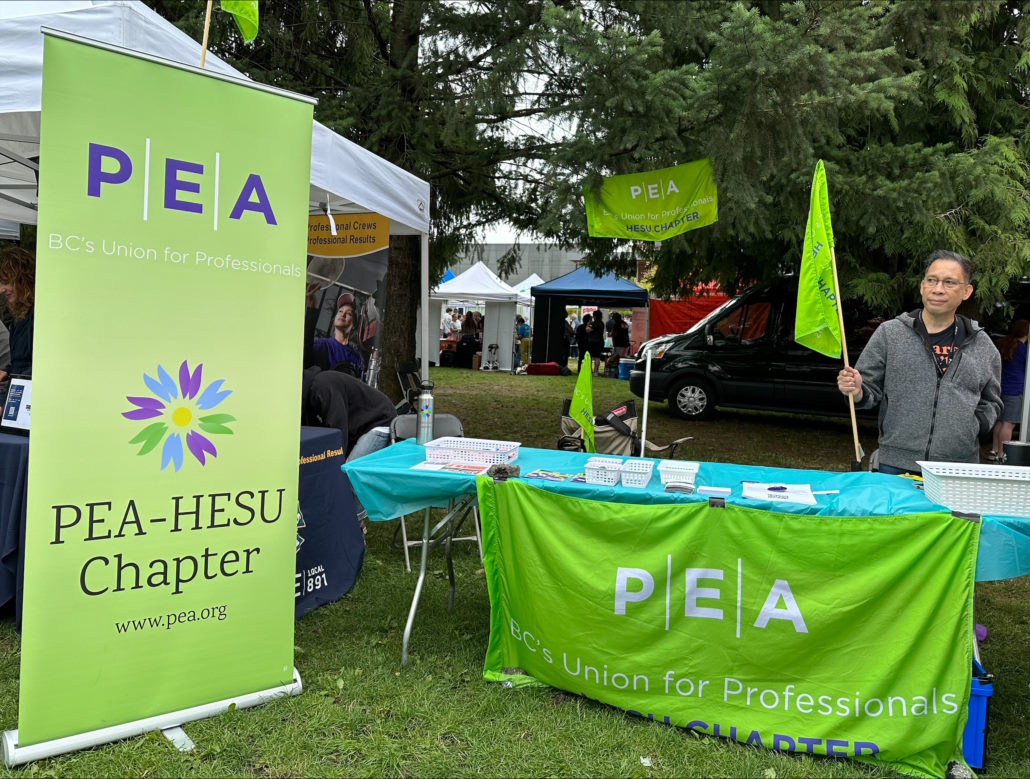
Happy Retirement
Congratulations to long time GLP local rep Doug Beckett on his retirement this past May. Doug spent nearly 35 years in the public service and finished his career as a regional timber supply forester in the forest analysis and inventory branch in Prince George. Special thanks to Doug for all his years of union advocacy during the Prince George pride parade and labour day festivities.
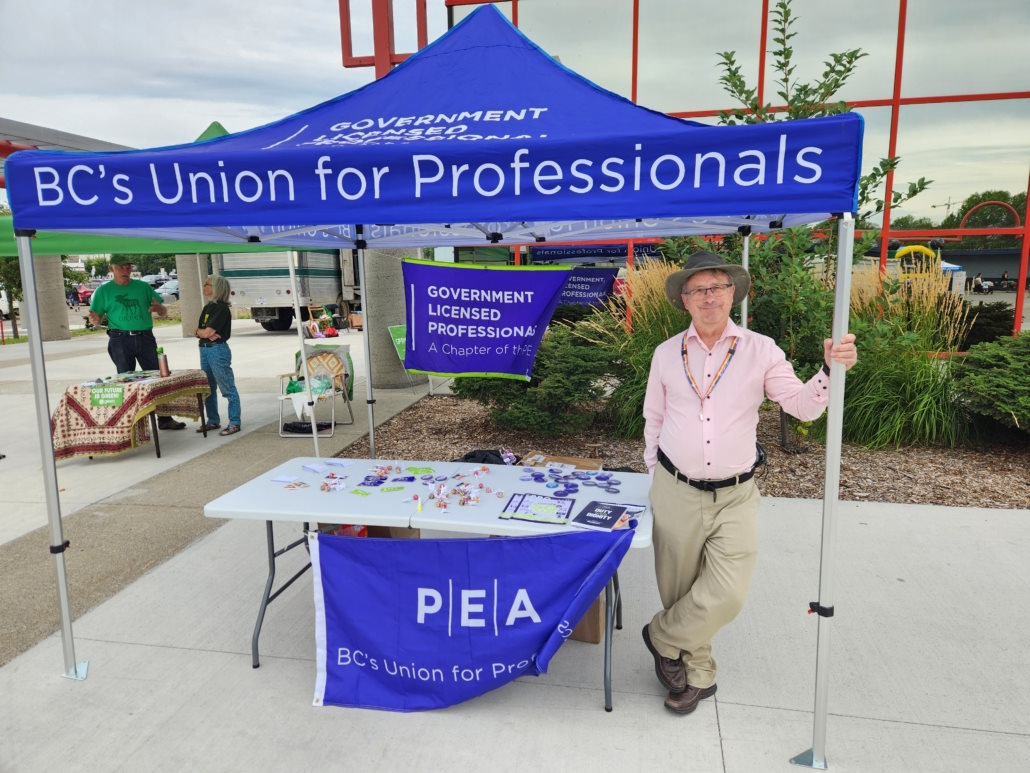
GLP GRANTS AND DONATIONS
GLP members can submit requests for funding of up to $250 for an activity or event to the GLP Grants and Donations Committee. Grants and donations are administered by the GLP Executive based on their consistency with the chapter’s strategic plan or promotion of the Association and GLP Chapter.
For the full eligibility considerations and policy visit our chapter web page . All grant and donation requests must be submitted using the online form at pea.org/chapters/glp/grant-form.
Submit your online request early and before December 2024 for year-end events
We acknowledge and respect the lək̓ʷəŋən peoples and the Songhees and Esquimalt Nations on whose traditional territory we work.
Join the Professional
Want The Professional delivered directly to your email inbox? Sign up for e-delivery today!



